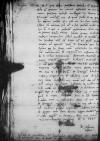Letter #796
Helius EOBANUS Hessus (KOCH) to Ioannes DANTISCUSNuremberg, 1532-06-12
Manuscript sources:
Prints:
| ||||||||||||||||
Text & apparatus & commentary Plain text Text & commentary Text & apparatus Excerpts concerning Dantiscus' travels
Reverendissimo domino
Salve, optime ac humanissime princeps Dantisce, patrone mi.
Quod toto eo tempore, quo a te abii, nihil a me litterarum acceperis, in causa primum fuit, quod ex molestissimo itinere mirabiliter aliquot diebus nauseabam et vix aegre concoquebam istas Ratisbonenses crapulas. Cum ecce hic novis et ferme cotidianis interim accipior ab amicis, qui vel reducem me amplexabantur, vel novi cum his principibus advenerunt, a quibus cum tandem me extricassem, reversus ad mea studia Ecclesiasten paene absolvi versu elegiaco. Quod velim,
Tibi, mi patrone, scio, quid sim pollicitus, nempe rediturum me perfecto Ecclesiaste, quod quia paucis diebus est futurum, scire valde cupio, sisne adhuc in eadem sententia atque istic tamdiu permansurus, donec ego rus rursus descendam ad  AAWO, AB, D. 3, f. 77v cui et si quae debeo, praestare fortassis non possum, dabo tamen operam, ut omnis posteritas ea me sinceriter praestare voluisse intellegat. De conventu horum principum nihildum certi est, quod scribam, et vos, quae hic agantur, melius istic quam nos hic scire existimo.
AAWO, AB, D. 3, f. 77v cui et si quae debeo, praestare fortassis non possum, dabo tamen operam, ut omnis posteritas ea me sinceriter praestare voluisse intellegat. De conventu horum principum nihildum certi est, quod scribam, et vos, quae hic agantur, melius istic quam nos hic scire existimo.
Saluta, precor, amantissime nostrum
Quantus ego hic tuarum virtutum Ecclesiastes sim, non credis; nam circumveniunt et urgent me superinscribed⌈meme superinscribed⌉, nec respirare sinunt de te, velut contionantem. Fortunate Dantisce, qui tuarum virtutum praeconem Eobanum invenisti. Non enim non possum iocari tecum tam candide iocos omnes accipienti.
Saluta optimos viros, fratres germanos tuos, dominos
Avidissime tuas litteras exspectabo nec veniam, nisi lite vel litteris, vel nuntiis significaris.
Salutat te amanter uxorcula mea ac on the margin in place of crossed-out quam⌈quam ac ac on the margin in place of crossed-out quam⌉ nihil omnino aeque se desiderare ait ac saepe te videre et atque alloqui, idque imprimis, quod tu nuper scribebas, fieri te sibi compatrem.
Labor meus in Ecclesiasten spero, non erit tibi et
Vale, praesulum ac litterarum decus vere unicum.
Vere tuus
Postscript:
Salutat te reverenter noster


